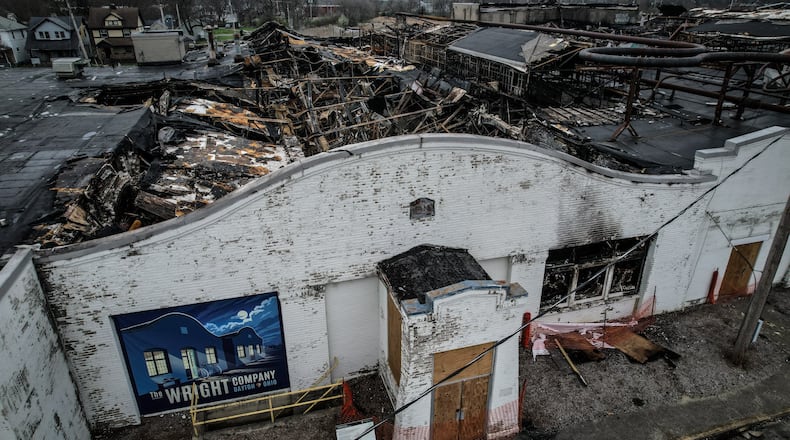The city hopes to soon hire a company to assess the West Dayton property.
Credit: JIM NOELKER
Credit: JIM NOELKER
Mackensie Wittmer, executive director of the National Aviation Heritage Area, said it is too soon to know how the fire might impact plans for the property.
“It’s still so early ... I really can’t speak to the extent of the damage, because I just don’t know,” she said. “And I can’t speak to what this means for the future because we don’t know the extent of the damage.”
A fire broke out at the Wright company airplane factory site in West Dayton on March 26 that caused significant damage to multiple hangar buildings. Aerial drone photographs show collapse and severe damage to parts of the roofs of multiple buildings on the site.
Two of the buildings on the site were historic and housed the first airplane manufacturing facilities in the United States, which belonged to the Wright brothers.
Credit: JIM NOELKER
Credit: JIM NOELKER
Three adjacent hangar buildings were constructed years later that matched the architectural style of the original factory buildings.
After the fire, city officials declared an emergency that allowed the city to use the services of Wiss, Janney, Elstner Associates to take a cursory look at the property, Joe Parlette, Dayton’s deputy city manager, said on March 29. The city already had the company under contract for different services.
Parlette said the city plans to pay for a structural engineering assessment.
“Hopefully out of that will come recommendations on the site’s future and the cost associated with redevelopment,” Parlette said.
Credit: JIM NOELKER
Credit: JIM NOELKER
The National Aviation Heritage Area wanted to preserve and restore the historic hangar factory buildings to make it part of the Aviation Heritage National Historical Park.
The city proposed investing about $3.4 million of its $138 million in federal COVID relief funds into the Wright factory site to help with its redevelopment.
The city said the historic hangars (buildings 1 and 2) would become an aviation museum and tourist destination.
The city said the plan for the three non-historic hangars (buildings 3, 4 and 5) was to renovate them into a 50,000-square-foot operational center for entrepreneurs who are people of color.
The city said the property could become home to a food hall, an urban market and community space.
The city said the goal was to create a mixed-use development offering retail, entertainment and dining options.
Credit: JIM NOELKER
Credit: JIM NOELKER
Before the fire, the historic hangars had nothing inside, but the buildings themselves had strong historic integrity, including the walls, the windows and the roof, Wittmer said.
Some of that historic fabric has been damaged or lost, she said.
The National Aviation Heritage Area has been working on this project for 20 years, Wittmer said, and a museum in the hangars would help complete the story of the national park, from the inception of the idea of aviation to the start of the aviation industry.
About the Author





